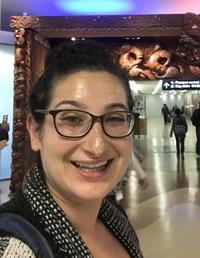Eve Brickner, an American expat, moved to New Zealand with her partner in 2017. A great lover of the outdoors, Eve enjoys exploring her new home's sublime countryside. Read about her life, as well as some of her tips and guides to living in New Zealand on her blog, Adventures with Pete.
Read more about New Zealand in the Expat Arrivals New Zealand country guide or read more expat experiences in New Zealand.
About Eve
 Q: Where are you originally from?
Q: Where are you originally from?
A: I’m originally from the U.S. and have lived in New York, Chicago, San Francisco and Portland, Oregon.
Q: Where are you living now?
A: I live in Christchurch, New Zealand.
Q: When did you move to Christchurch?
A: I moved to Christchurch in November 2017.
Q: Did you move to New Zealand alone or with a spouse/family?
A: I moved with my partner, Pete, who is originally from Wellington.
Q: Why did you move to New Zealand and what do you do there?
A: Having moved around a lot as a kid, I’ve always loved the challenge of going somewhere totally unknown and making it feel like home. Pete and I knew that eventually, we wanted to make the jump overseas, and it made sense to go sooner rather than later, while we were still relatively untied down. My job as a non-profit fundraiser didn’t make me eligible for many international work visas, but I qualified for permanent residency as a partner in New Zealand and so that’s how we ended up here.
I was really lucky and found a position straight away as a fundraiser for St. John South Island. St. John is a charity that provides emergency ambulance services, as well as other important community programs across New Zealand.
Living in New Zealand
Q: What do you enjoy most about Christchurch? How would you rate the quality of life in New Zealand compared to the US?
A: Christchurch’s location can’t be beaten if you enjoy getting outdoors. We’re about a 15-minute drive from the ocean, and you can get to the Southern Alps in under two hours. There are tons of hiking trails nearby, and you’ll almost never have to worry about traffic or parking. Everything feels very accessible.
Q: Are there any negatives to life in New Zealand? What do you miss most about the US?
A: I’ve actually talked about this on my blog, but boy oh boy do I miss the quality of American radio. Talk radio here can get a bit cringeworthy and, when travelling through some of the more rural areas (AKA most of New Zealand), the car radio will often lose signal. Instead of relying on radio, we usually download our favourite podcasts like Freakonomics and Wait Wait Don’t Tell Me before going on road trips.
Q: What are the biggest adjustments you had to make when settling into expat life in New Zealand? Did you experience any particular elements of culture shock?
A: Everything in New Zealand happens at a much slower pace. As I’ve been planning my wedding, I’ve contacted vendors for quotes, and it’s taken as long as three weeks to hear back from them, which can be frustrating.
Q: What’s the cost of living in New Zealand compared to the US? Is there anything cheaper or more expensive in New Zealand?
A: The cost of living here is higher than back home, but you get more bang for your buck. Living in San Francisco and Portland meant that we paid a lot in rent for relatively small apartments. Here, in New Zealand, we are paying less and have upgraded from living in an apartment to living in a proper house with a backyard and garage.
Eating out and food, in general, is much more expensive here, with the average meal costing about 15 to 20 NZD for a main, so we eat in a lot more than we used to. Alcohol is also significantly more expensive. The other day I saw a bottle of Patron Silver at the bottle shop for 130 NZD, which is more than double what you would pay in the US.
Q: How would you rate the public transport in Christchurch? What are the different options? Do you need to own a car to get around?
A: Public transportation within Christchurch is good if you’re heading into town. I take the bus to work, and it’s an easy 20-minute ride to the Bus Interchange (the main city bus terminal in central Christchurch). It does get trickier if you’re trying to go somewhere on the city periphery, so having a car can definitely come in handy. If you don’t have a car or haven’t yet mastered driving on the left, bikes are also a good way to get around.
Q: How do you rate the standard of housing in Christchurch? What different options are available for expats?
A: New Zealand homes are notorious for poor insulation and single-glazed windows. If you’re looking to avoid hypothermia in the winter, rent a newer home or try to find something that’s been renovated. TradeMe is a great place to look for renting or buying.
Q: Are there any areas or suburbs in Christchurch that you’d recommend for expats to live in?
A: I’d recommend Sydenham, Spreydon, and Beckenham if you’re looking for a nice house to rent. As a student, you’ll probably want to be in Riccarton, which is close to the University.
Meeting people and making friends in New Zealand
Q: Was it easy meeting people and making friends in New Zealand? How did you go about meeting new people?
A: Kiwis can be a bit reserved when it comes to making new friends. Pete and I both rock climb, and we’ve been able to make friends at the local climbing gym. In general, I think that sports are a great way to meet people.
Working in New Zealand
Q: Did you have a problem getting a visa or work permit for New Zealand? Did you tackle the visa process yourself or did you enlist the services of an immigration consultant?
A: I applied for a visa myself and did make a few mistakes along the way but, fortunately, my assigned immigration officer was really helpful. I’d recommend investing in Skype credit, so you can call the immigration hotline as soon as questions come up.
Q: What’s the economic climate like in Christchurch? Do you have any tips for expats looking to find a job there? Which resources did you find most useful?
A: I’ve heard that it can be challenging to find a full-time permanent role, but I was lucky enough to find a job fairly quickly, so that wasn’t my experience. That being said, I started networking and reaching out to recruiters months before making the move. It gave me time to refine my CV and to have interviews lined up for once I got here.
Q: How does the work culture in New Zealand differ from the US? Do you have any tips for expats doing business in New Zealand?
A: One of my favourite things has been seeing how Kiwis prioritise their work/life balance. Anyone working a full-time job is guaranteed a minimum of four weeks annual leave, and you’ll never be made to feel guilty for using it.
And finally…
Q: Is there any other advice you would like to offer to new expats arriving in New Zealand?
A: Wear sunscreen! New Zealand is located just under the hole in the ozone layer, making it really easy to get sunburnt. Wear SPF even on a cloudy day and your skin will thank you.
~Interviewed May 2018



